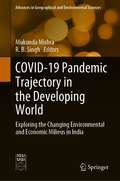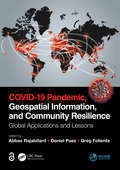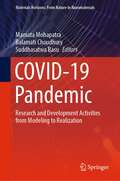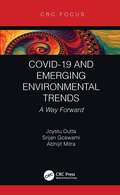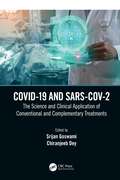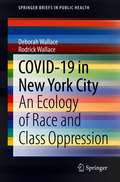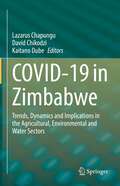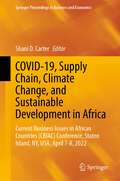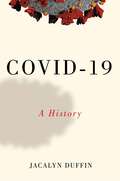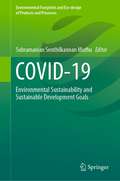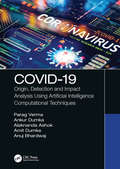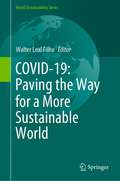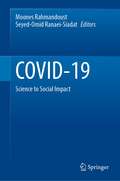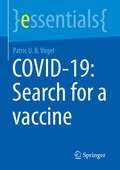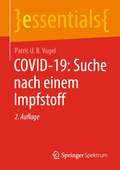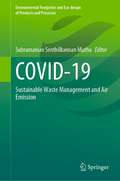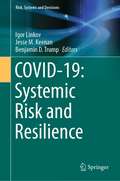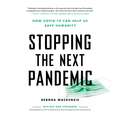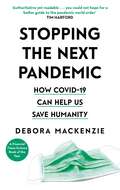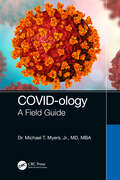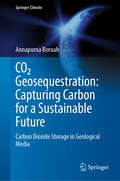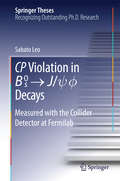- Table View
- List View
COVID-19 Pandemic Trajectory in the Developing World: Exploring the Changing Environmental and Economic Milieus in India (Advances in Geographical and Environmental Sciences)
by R. B. Singh Mukunda MishraWe are witnessing an unprecedented global outbreak of COVID-19, which has been devastating in its consequences. Beyond the acute health hazard, the pandemic has carried with it other threats for mankind associated with the human economy, society, culture, psychology and politics. Amidst these multifarious dimensions of the pandemic, it is high time for global solidarity to save humankind.Human society, its ambient environment, the process of socio-economic development, and politics and power – all are drivers to establish the world order. All these parameters are intimately and integrally related. The interconnections of these three driving forces have a significant bearing on life, space and time. In parallel, the interrelationship between all these drivers is dynamic, and they are changed drastically with time and space. The statistics serve to align the thought, based on which social scientists need to understand the prevailing equation to project the unforeseen future. The trajectory of the future world helps in planning and policymaking with a scientific direction.The practitioners of all academic disciplines under the umbrella of the social sciences need a common platform to exchange ideas that may be effective in the sustainable management of the crisis and the way forward after it is mitigated. This book provides multidisciplinary contributions for expressing the solidarity of academic knowledge to fight against this global challenge. It is crucial that there should be an on-going discussion and exchange of ideas, not only from the perspective of the current times but keeping in view the preparedness for unforeseen post-COVID crises as well.
COVID-19 Pandemic, Geospatial Information, and Community Resilience: Global Applications and Lessons
by Abbas RajabifardGeospatial information plays an important role in managing location dependent pandemic situations across different communities and domains. Geospatial information and technologies are particularly critical to strengthening urban and rural resilience, where economic, agricultural, and various social sectors all intersect. Examining the United Nations' SDGs from a geospatial lens will ensure that the challenges are addressed for all populations in different locations. This book, with worldwide contributions focused on COVID-19 pandemic, provides interdisciplinary analysis and multi-sectoral expertise on the use of geospatial information and location intelligence to support community resilience and authorities to manage pandemics.
COVID-19 Pandemic: Research and Development Activities from Modeling to Realization (Materials Horizons: From Nature to Nanomaterials)
by Balamati Choudhury Mamata Mohapatra Suddhasatwa BasuThis book provides a comprehensive overview of recent novel coronavirus (SARS-CoV-2) infection and discusses developments in the field of nanoparticle/inorganic/organic materials development for antiviral application, therapeutic applications, PPE kit formulations and inclusion of simulated data. The contents focus on measures to keep the infections in check, materials aspects for detection and monitoring, AI modeling for prediction of spread of the virus, among others. This book will be a useful reference for researchers, scientists and policy makers alike.
COVID-19 and Emerging Environmental Trends: A Way Forward
by Abhijit Mitra Joystu Dutta Srijan GoswamiThe extensive safety restrictions imposed globally due to the COVID-19 pandemic have brought significant changes to almost all environmental parameters. The largest pandemic of the century has left an indelible mark on all aspects of human life and the environment. This book revolves around COVID-19 and its influence on all biotic and abiotic components on earth, with a focus on the regulatory role of air quality during the pandemic, environmental toxicity and susceptibility to COVID-19, and the impact of the lockdown on different ecosystems. The book fundamentally explains the biology of SARS-CoV-2 and the pathophysiology and epidemiology of COVID-19. Dedicated chapters highlight the ongoing global cutting-edge research on COVID-19, control and safety measures, and public health concerns. COVID-19 and Emerging Environmental Trends: A Way Forward is aimed at graduate and postgraduate students as well as researchers in environmental and medical science, health and safety, and ecology. This book offers a multiperspective and multidisciplinary approach to the discussion of the pandemic as well as emerging environmental issues, current trends, and a way forward. As humanity stands face-to-face with the largest global crisis in recent times, this book helps readers to easily understand its various aspects from a beginner’s perspective, without going into the intricate technicalities of medical science or environmental science, and beautifully juxtaposes critical issues with lucid language and flexible scientific explanations.
COVID-19 and SARS-CoV-2: The Science and Clinical Application of Conventional and Complementary Treatments
by Srijan Goswami and Chiranjeeb DeySince the end of December 2019, the world has been battling with a global health emergency called COVID-19. This ongoing pandemic has claimed millions of lives worldwide and made a serious impact on global healthcare. The information and facts about the virus and the pandemic are constantly evolving, expanding and are present in a scattered manner. Above all, various rumors and false information are also spreading through word of mouth or social media in relation to the pandemic. In situations like this, it becomes hard for a common person as well as professionals to keep track of the fundamental concepts, ongoing scientific advancements and differentiate between the facts and myths. COVID-19 and SARS-CoV-2: The Science and Clinical Application of Conventional and Complementary Treatments covers the fundamental concepts regarding SARS-CoV-2 and COVID–19 as well as common concerns and issues ensuring optimal understanding of the latest basic science and clinical content. The comparative coverage of Conventional Medical Science with Complementary and Alternative Systems of Medicine in relation to the ongoing pandemic makes this book unique compared to other books available on COVID-19. Written in textbook format and in semi-technical style, it provides basic to advanced concepts and multidimensional clinical perspectives keeping in mind the diverse needs of academicians, researchers, students and common people. Key Features: Contains simple, lucid and concise presentation of contents Emphasizes core knowledge and concepts Presents evidence based and up to date information from a multidisciplinary perspective Includes illustrations with good quality diagrams and colored photographs for ease of understanding. COVID-19 and SARS-CoV-2 covers concepts and protocols from holistic perspective relating to core Molecular Biology of SARS-CoV-2, Clinical and Therapeutic Aspects, Multidisciplinary Treatment and Management Strategies like Conventional Pharmacological Treatments, Vaccines, Ayurveda, Homoeopathy, Holistic Nutrition Therapy, Nutraceutical Therapy, Biochemic Medicine, and Issues and Concerns relating to Public Health and Ongoing Advances in Research in relation to COVID-19. Written in semi-technical language easily understandable by readers from all domains, this book provides multidisciplinary perspective, knowledge and understanding regarding COVID-19 in one place, thus bridging the knowledge gap that exists between Conventional Sciences and Complementary and Alternative Medicine Systems.
COVID-19 in New York City: An Ecology of Race and Class Oppression (SpringerBriefs in Public Health)
by Rodrick Wallace Deborah WallaceThis book is the first social epidemiological study of COVID-19 spread in New York City (NYC), the primary epicenter of the United States. New York City spread COVID-19 throughout the United States. The context of epicenter formation determined the rapid, extreme rise of NYC case and mortality rates. Decades of public policies destructive of poor neighborhoods of color heavily determined the spread within the City. Premature mortality rates revealed the "weathering" of policy-targeted communities: accelerated aging due to chronic stress. COVID attacks the elderly more severely than those under the age of 60. Communities with high proportions of prematurely aged residents proved fertile ground for COVID illness and mortality. The very public policies that created swaths of white wealth across much of Manhattan and parts of Brooklyn destroyed the human diversity needed to ride out crises. Topics covered within the chapters include: Premature Death Rate Geography in New York City: Implications for COVID-19 NYC COVID Markers at the ZIP Code Level Prospero's New Castles: COVID Infection and Premature Mortality in the NY Metro Region Pandemic Firefighting vs. Pandemic Fire Prevention Conclusion: Scales of Time in Disasters An exemplary study in health disparities, COVID-19 in New York City: An Ecology of Race and Class Oppression is essential reading for social epidemiologists, public health researchers of health disparities, those in public service tasked with addressing these problems, and infectious disease scientists who focus on spread in human populations of new zoonotic diseases. The brief also should appeal to students in these fields, civil rights scholars, science writers, medical anthropologists and sociologists, medical and public health historians, public health economists, and public policy scientists.
COVID-19 in Zimbabwe: Trends, Dynamics and Implications in the Agricultural, Environmental and Water Sectors
by Kaitano Dube David Chikodzi Lazarus ChapunguThis contributed volume, based on papers presented at a conference held in Zimbabwe in mid-2021, interrogates solutions to COVID-19-related problems and issues across agricultural, environmental and water sectors in Zimbabwe and assesses their scientific, economic and practical validity. Across 19 chapters, this volume unpacks the science, economics and politics of the pandemic with a focus on understanding its secondary and tertiary impact on Zimbabwe’s population. The volume is also dedicated to understanding the practical and policy-oriented approaches in tackling the pandemic and confronting the “new normal” of COVID-19. It brings together researchers, development practitioners and policy makers from various disciplines in an endeavour to understand COVID-19 trends and analyse the scientific options for mitigation, containment, innovation and ultimately pre-empt the possible emergence and impacts of other pandemics in the future
COVID-19, Supply Chain, Climate Change, and Sustainable Development in Africa: Current Business Issues in African Countries (CBIAC) Conference, Staten Island, NY, USA, April 7-8, 2022 (Springer Proceedings in Business and Economics)
by Shani D. CarterAll global countries are interdependent and all aspects of the global economy operate synergistically. The COVID-19 pandemic gave a renewed sense of urgency to focus on the synergies between supply chain, climate change, COVID-19, and sustainable development as they affect business in Africa and how what occurs in one part of the world affects the whole world. This book examines this synergy and the reciprocal impact of businesses, government, and society. Featuring contributions presented at the 2022 Current Business Issues in African Countries (CBIAC) Conference held at Wagner College in Staten Island, NY, USA, this book explores topics such as agriculture, entrepreneurship, education, gender, and capital flows in Africa demonstrating the wealth of business opportunities across the continent.
COVID-19: A History (Canadian Essentials)
by Jacalyn DuffinFor two years the COVID-19 pandemic has upended the world. The physician and medical historian Jacalyn Duffin presents a global history of the virus, with a focus on Canada.Duffin describes the frightening appearance of the virus and its identification by scientists in China; subsequent outbreaks on cruise ships; the relentless spread to Europe, the Americas, Africa, and elsewhere; and the immediate attempts to confront it. COVID-19 next explores the scientific history of infections generally, and the discovery of coronaviruses in particular. Taking a broad approach, the book explains the advent of tests, treatments, and vaccines, as well as the practical politics behind interventions, including quarantines, barrier technologies, lockdowns, and social and financial supports. In concluding chapters Duffin analyzes the outcome of successive waves of COVID-19 infection around the world: the toll of human suffering, the successes and failures of control measures, vaccine rollouts, and grassroots opposition to governments’ attempts to limit the spread and mitigate social and economic damages.Closing with the fraught search for the origins of COVID-19, Duffin considers the implications of an “infodemic” and provides an cautionary outlook for the future.
COVID-19: Environmental Sustainability and Sustainable Development Goals (Environmental Footprints and Eco-design of Products and Processes)
by Subramanian Senthilkannan MuthuThis book highlights the impact of COVID-19 on environmental sustainability and SDG’s, using various case studies. The year 2020 was a historical year mainly due to the pandemic caused by COVID-19 and it influenced or affected the global economy, business models and the industrial sectors, thus impacting sustainability in various ways. Given that sustainability has many faces and facets, it is worthwhile to deal with the relation (or impact) of COVID-19 on various elements of sustainability. This book presents how COVID-19 has influenced Environmental Sustainability along with the SDG’s.
COVID-19: Origin, Detection and Impact Analysis Using Artificial Intelligence Computational Techniques
by Ankur Dumka Alaknanda Ashok Parag Verma Amit Dumka Anuj BhardwajThis book highlights progress in terms of Virus Biology and Infection Detection, Prevention, and Control, along with Screening, Testing, and Detection Techniques, that will provide learners and researchers (from basic to advanced) with the most innovative computer-driven methodologies for the fight against COVID-19. In addition, this book also covers the Pre- and Post-Impact of the COVID-19 Pandemic Crisis that will definitely provide useful content for researchers to think broadly about the analytical areas affected by COVID-19. This ultimately shows different paths to the same destination to help understand the nature of the COVID-19 pandemic and how to avoid it in the future.
COVID-19: Paving the Way for a More Sustainable World (World Sustainability Series)
by Walter Leal FilhoThis book gathers and disseminates opinions, viewpoints, studies, forecasts, and practical projects which illustrate the various pathways sustainability research and practice may follow in the future, as the world recovers from the COVID-19 pandemic and prepares itself to the possibilities of having to cope with similar crisis, a product of the Inter-University Sustainable Development Research Programme (IUSDRP) https://www.haw-hamburg.de/en/ftz-nk/programmes/iusdrp.html and the European School of Sustainability Science and Research (ESSSR) https://esssr.eu/. The COVID-19 pandemic has led to severe human suffering, and to substantial damages to economies around the globe, affecting both rich countries and developing ones. The aftermath of the epidemic is also expected to be felt for sometime. This will also include a wide range of impacts in the ways sustainable development is perceived, and how the principles of sustainability are practised.There is now a pressing need to generate new literature on the connections between COVID-19 and sustainability. This is so for two main reasons. Firstly, the world crisis triggered by COVID-19 has severely damaged the world economy, worsening poverty, causing hardships, and endangering livelihoods. Together, these impacts may negatively influence the implementation of sustainable development as a whole, and of the UN Sustainable Development Goals in particular. These potential and expected impacts need to be better understood and quantified, hence providing a support basis for future recovery efforts. Secondly, the shutdown caused by COVID-19 has also been having a severe impact on teaching and research, especially –but not only – on matters related to sustainability. This may also open new opportunities (e.g. less travel, more Internet-based learning), which should be explored further, especially in the case of future pandemics, a scenario which cannot be excluded.The book meets these perceived needs.
COVID-19: Science to Social Impact
by Moones Rahmandoust Seyed-Omid Ranaei-SiadatThis book highlights the overview of the COVID-19 pandemic from both the scientific and the social perspectives. The scientific part presents key facts of COVID-19, including the structure of the virus and the techniques for the diagnosis, treatment, and vaccine development against the disease, covering state-of-the-art findings and achievements worldwide. The social part is written by WHO professionals who worked on the frontier of the fight against the disease. It covers the global security situation during the pandemic, the WHO and governmental-level risk management measures, and the estimated impact that COVID-19 will eventually create on social life after it is globally controlled.
COVID-19: Search for a vaccine (essentials)
by Patric U. VogelThis book presents the principle, strengths and weaknesses, and progress of various vaccine technologies against COVID-19. Additionally, important terms such as clinical phases, efficacy and sterilizing immunity are explained. In this second edition, the already approved vaccines are also presented and the importance of viral variants is explained
COVID-19: Suche nach einem Impfstoff (essentials)
by Patric U. VogelIn diesem Buch werden das Prinzip, die Stärken und Schwächen sowie der Fortschritt verschiedener Impfstofftechnologien gegen COVID-19 dargestellt. Es werden zusätzlich wichtige Begriffe wie klinische Phasen, Wirksamkeit und sterilisierende Immunität erklärt. In dieser zweiten Auflage werden auch die bereits zugelassenen Impfstoffe vorgestellt sowie die Bedeutung von Virusvarianten erklärt.
COVID-19: Sustainable Waste Management and Air Emission (Environmental Footprints and Eco-design of Products and Processes)
by Subramanian Senthilkannan MuthuThis book highlights the impact of COVID-19 on sustainable waste management and air emission, using various case studies. The year 2020 was a historical year mainly due to the pandemic caused by COVID-19 and it influenced or affected the global economy, business models and the industrial sectors, thus impacting sustainability in various ways. Given that sustainability has many faces and facets, it is worthwhile to deal with the relation (or impact) of COVID-19 on various elements of sustainability. This book presents how COVID-19 has influenced waste management and air quality.
COVID-19: Systemic Risk and Resilience (Risk, Systems and Decisions)
by Igor Linkov Jesse M. Keenan Benjamin D. TrumpThis book aims to provide a collection of early ideas regarding the results of applying risk and resilience tools and strategies to COVID-19. Each chapter provides a distinct contribution to the new and rapidly growing literature on the developing COVID-19 pandemic from the vantage points of fields ranging from civil and environmental engineering to public policy, from urban planning to economics, and from public health to systems theory. Contributing chapters to the book are both scholars and active practitioners, who are bridging their applied work with critical scholarly interpretation and reflection. The book's primary purpose is to empower stakeholders and decision-makers with the most recent research in order that they can better understand the systemic and sweeping nature of the COVID-19 pandemic, as well as which strategies could be implemented to maximize socioeconomic and public health recovery and adaptation over the long-term.
COVID-19: The Pandemic that Never Should Have Happened and How to Stop the Next One
by Debora MacKenzieIn a gripping, accessible narrative, a veteran science journalist lays out the shocking story of how the COVID-19 coronavirus pandemic happened and how to make sure this never happens againOver the last 30 years of epidemics and pandemics, we learned nearly every lesson needed to stop this coronavirus outbreak in its tracks. We heeded almost none of them. The result is a pandemic on a scale never before seen in our lifetimes. In this captivating, authoritative, and eye-opening book, science journalist Debora MacKenzie lays out the full story of how and why it happened: the previous viruses that should have prepared us, the shocking public health failures that paved the way, the failure to contain the outbreak, and most importantly, what we must do to prevent future pandemics.Debora MacKenzie has been reporting on emerging diseases for more than three decades, and she draws on that experience to explain how COVID-19 went from a potentially manageable outbreak to a global pandemic. Offering a compelling history of the most significant recent outbreaks, including SARS, MERS, H1N1, Zika, and Ebola, she gives a crash course in Epidemiology 101--how viruses spread and how pandemics end--and outlines the lessons we failed to learn from each past crisis. In vivid detail, she takes us through the arrival and spread of COVID-19, making clear the steps that governments knew they could have taken to prevent or at least prepare for this. Looking forward, MacKenzie makes a bold, optimistic argument: this pandemic might finally galvanize the world to take viruses seriously. Fighting this pandemic and preventing the next one will take political action of all kinds, globally, from governments, the scientific community, and individuals--but it is possible.No one has yet brought together our knowledge of COVID-19 in a comprehensive, informative, and accessible way. But that story can already be told, and Debora MacKenzie's urgent telling is required reading for these times and beyond. It is too early to say where the COVID-19 pandemic will go, but it is past time to talk about what went wrong and how we can do better.
COVID-19: The Pandemic that Never Should Have Happened, and How to Stop the Next One
by Debora MacKenzie'Excellent . . . analyses clearly and authoritatively how the coronavirus pandemic played out, what governments should have done, and what we need to do when it happens again - as it undoubtedly will' Financial Times'You could not hope for a better guide to the pandemic world order than Debora MacKenzie, who's been on this story from the start. This is an authoritative yet readable explanation of how this catastrophe happened - and more important, how it will happen again if we don't change'Tim Harford, author of The Undercover Economist, Adapt and Messy'This definitely deserves a read - the first of the post mortems by a writer who knows what she's talking about'Laura Spinney, author of Pale Rider: The Spanish Flu of 1918 and How It Changed the WorldIn a gripping, accessible narrative, a veteran science journalist lays out the shocking story of how the COVID-19 coronavirus pandemic happened and how to make sure this never happens againOver the last 30 years of epidemics and pandemics, we learned every lesson needed to stop this coronavirus outbreak in its tracks. We heeded almost none of them. The result is a pandemic on a scale never before seen in our lifetimes. In this captivating, authoritative, and eye-opening book, science journalist Debora MacKenzie lays out the full story of how and why it happened: the previous viruses that should have prepared us, the shocking public health failures that paved the way, the failure to contain the outbreak, and most importantly, what we must do to prevent future pandemics.Debora MacKenzie has been reporting on emerging diseases for more than three decades, and she draws on that experience to explain how COVID-19 went from a potentially manageable outbreak to a global pandemic. Offering a compelling history of the most significant recent outbreaks, including SARS, MERS, H1N1, Zika, and Ebola, she gives a crash course in Epidemiology 101--how viruses spread and how pandemics end--and outlines the lessons we failed to learn from each past crisis. In vivid detail, she takes us through the arrival and spread of COVID-19, making clear the steps that governments knew they could have taken to prevent or at least prepare for this. Looking forward, MacKenzie makes a bold, optimistic argument: this pandemic might finally galvanize the world to take viruses seriously. Fighting this pandemic and preventing the next one will take political action of all kinds, globally, from governments, the scientific community, and individuals--but it is possible.No one has yet brought together our knowledge of COVID-19 in a comprehensive, informative, and accessible way. But that story can already be told, and Debora MacKenzie's urgent telling is required reading for these times and beyond. It is too early to say where the COVID-19 pandemic will go, but it is past time to talk about what went wrong and how we can do better.
COVID-ology: A Field Guide
by Michael T. Myers, Jr.The COVID-19 outbreak and response has been characterized by institutional missteps, media misinformation, and economic and social upheavals. This book is intended to de-mystify and inform in a succinct and straightforward text. The lessons shared are applicable to other infectious diseases and future inevitable pandemics. Readers will learn about the origins of COVID-19, the disease it causes, tests and how they work, therapeutics and prophylactic measures such as vaccines. This text prepares readers to be better able to respond to future emerging infectious diseases and pandemics. Key Features Positively influences career choices within public health Applies basic science to problems raised by the COVID-19 pandemic such as vaccine development and herd immunity Prepares readers with context and tactics for understanding future infectious disease outbreaks Successfully used in college senior health sciences seminars Engaging and balanced treatment of the politicization of public health issues, especially COVID-19 Related Titles Goswami, S. & C. Day, eds. COVID-19 and SARS-CoV-2: The Science and Clinical Application of Conventional and Complimentary Treatments (ISBN 9781032011950). Koley, T. K. & M. Dhole. The COVID-19 Pandemic: The Deadly Coronavirus Outbreak (ISBN 9780367558895). Ryan, J. M., ed. COVID-19 – Two volume set (ISBN 9780367740610).
CO₂ Geosequestration: Carbon Dioxide Storage in Geological Media (Springer Climate)
by Annapurna BoruahAs the world faces the urgent need to combat climate change, "CO2 Geosequestration: Capturing Carbon for a Sustainable Future" provides a comprehensive solution on carbon dioxide storage in geological media, and utilization to reduce the CO2 from the atmosphere. This book serves as a guide to understanding the science and technology for carbon dioxide geosequestration. In this engaging guide, the author delves into innovative methods and processes designed to securely store CO2 emissions from various sources. With a focus on environmental sustainability, the book explores the geological storage of carbon dioxide in depleted oil and gas reservoirs, coal, shale, saline aquifers, basalt, and other underground formations, ensuring that this remains safely sequestered for the long term. Through a blend of real-world case studies, cutting-edge research, and expert insights, CO2 Geosequestration highlights the potential of this technology to mitigate greenhouse gas emissions and reduce the carbon footprint of industries worldwide. From the basics of carbon capture to the intricate details of monitoring and verification, this book offers an in-depth look at the challenges, opportunities, and prospects of CO2 geosequestration. Whether you are a scientist, engineer, policymaker, or environmentally conscious individual, this book provides a valuable resource for understanding the fundamental principles and potential benefits of geosequestration in the fight against climate change. Join us on a journey toward a sustainable future where carbon capture and geosequestration play critical roles in protecting our planet for generations to come.
CP Violation
by I. I. Bigi A. I. SandaWhy didn't the matter in our Universe annihilate with antimatter immediately after its creation? The study of CP violation may help to answer this fundamental question. This book presents theoretical tools necessary to understand this phenomenon. Reflecting the explosion of new results over the last decade, this second edition has been substantially expanded. It introduces charge conjugation, parity and time reversal, before describing the Kobayashi-Maskawa (KM) theory for CP violation and our understanding of CP violation in kaon decays. It reveals how the discovery of B mesons has provided a new laboratory to study CP violation with KM theory predicting large asymmetries, and discusses how these predictions have been confirmed since the first edition of this book. Later chapters describe the search for a new theory of nature's fundamental dynamics. This book is suitable for researchers in high energy, atomic and nuclear physics and the history and philosophy of science.
CP Violation in {B_s}^0 -> J/psi.phi Decays: Measured with the Collider Detector at Fermilab (Springer Theses)
by Sabato LeoThis thesis reports on the final measurement of the flavor-mixing phase in decays of strange-bottom mesons (B_s) into J/psi and phi mesons performed in high-energy proton-antiproton collisions recorded by the Collider Experiment at Fermilab. Interference occurs between direct decays and decays following virtual particle-antiparticle transitions (B_s-antiB_s). The phase difference between transition amplitudes ("mixing phase") is observable and extremely sensitive to contributions from non-standard-model particles or interactions that may be very hard to detect otherwise - a fact that makes the precise measurement of the B_s mixing phase one of the most important goals of particle physics. The results presented include a precise determination of the mixing phase and a suite of other important supplementary results. All measurements are among the most precise available from a single experiment and provide significantly improved constraints on the phenomenology of new particles and interactions.
CPO Focus on Physical Science
by Thomas C. HsuMiddle school science textbook, with many experiments and activities.
